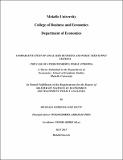| dc.description.abstract | Seed is generally considered to be the most affordable external input for farmers, and many of its benefits are assumed to be scale-neutral. So investments in crop improvement potentially can reach a wide range of farmers. While many other areas are also important for agricultural development such as markets, credit supply, support institutions, and policies access to appropriate seed is clearly the first step. This study is intended for comparative study of LSB and Public seed supply systems’ of the study area; to map the actor’s linkages to identify influential factors for the smooth functioning of the system and to explore the influence of policy in providing an enabling environment in relation to the seed supply system in Atsbiwemberta Woreda. Two stages sampling were used in which both nonrandom sampling and systematic random sampling procedures were followed to select two tabia and 134 respondents. Structured interview schedule and questionnaires were used for collecting the essential quantitative and qualitative data from the sampled respondents and seed suppliers respectively. To generate qualitative data, field observations; informal interview with key informants; and discussions with separate focus groups were conducted. The quantitative data were analyzed using descriptive statistical tools chi-square test, t-test and Logistic Regressions from inferential statistics. The major output of the study indicates that the system is highly characterized by relatively good linkage between actors and farmers in the study area. Moreover, participation in seed supply system was significantly influenced by household family size, radio owner ship, access to market, extension service and credit access. In addition to this, from the supply sector factors like skilled man power, delay of temporary loan settlement by users, policy environment, storage facilities at grass root level, efficient marketing system, timely demand claims from users, clearly defined role and responsibilities of each partner, availability of improved seeds in terms of their germination, viability and adaptability, farmers willingness to take risks and demand for improved crop varieties were some of mentioned factors that influence the system positively and/or negatively. As to the enabling policy environment, pitfalls identified were; inflexibility of rules and regulations, lack of strong quarantine measures on imported seeds and prolonged time given for variety release and registration were amongst all. Therefore, it is recommended that, the existing extension service should be strengthened in a way that working in harmony with relevant actors to bring about change for efficient and effective delivery of improved seed. Likewise, policy should account the flexibility of rules on credit provision and organization of small farmers groups in addressing resource poor farmers to ensure food self sufficiency of rural community in particular and the nation at large. | en_GB |


